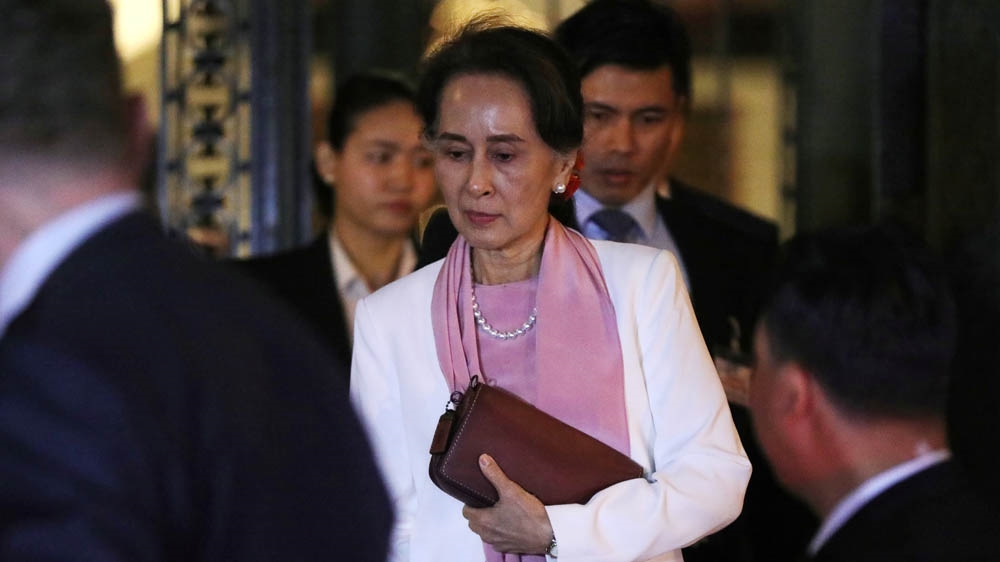Myanmar cannot be trusted to put own soldiers on trial: Gambia
ICJ hearing draws to close as Aung San Suu Kyi faces fresh criticism for defending Myanmar against genocide allegation.

Myanmar cannot be trusted to hold its soldiers accountable for alleged atrocities against its Rohingya minority, and measures to stop the violence need to be taken immediately, a lawyer presenting a genocide case against the country said on Thursday.
Speaking on the third and final day of hearings at the International Court of Justice (ICJ) in the case brought by The Gambia under the 1948 Genocide Convention, the West African country’s lead lawyer repeated its demand for “provisional measures” to restrain the Myanmar military until the case is heard in full.
Keep reading
list of 3 itemsRohingya refugees reject Aung San Suu Kyi’s ‘lies on genocide’
At top court, Myanmar urged to ‘stop genocide of own people’
Paul Reichler said Myanmar had not even tried during the hearings to deny most of the accusations of extreme violence made against its military, known officially as the Tatmadaw, nor of the mass deportation of Rohingya following a 2017 crackdown.
Statements from Myanmar that it was taking action to prosecute soldiers accused of wrongdoing were incredible, he said.
“How can anyone possibly expect the Tatmadaw to hold itself accountable for genocidal acts against the Rohingya, when six of its top generals including the commander-in-chief, Senior General Min Aung Hlaing, have all been accused of genocide by the UN fact-finding mission and recommended for criminal prosecution,” he told the panel of 17 judges.
He was referring to the findings of United Nations investigators who in an August 2018 report said the Myanmar military had carried out killings and mass rape with “genocidal intent” in the 2017 operation.
The Gambia’s legal team had outlined graphic testimony from the UN report at the first day of hearings on Tuesday.
Reed Brody, a commissioner at the International Commission of Jurists, who was instrumental in the prosecution of former Chadian President Hissene Habre, told Al Jazeera: “It was stunning to watch [Myanmar’s de-facto civilian leader] Aung San Suu Kyi stonily listening and to imagine the people of Myanmar watching as Reichler laid out the UN findings pointing to Myanmar’s genocidal intent.”
“The bar for proving genocide is very high but Gambia might reach it, thanks to all the evidence.”
More than 730,000 Rohingya fled Myanmar to Bangladesh after the military launched its crackdown. The UN investigators have said 10,000 people may have been killed.
Heading needed
Speaking on Thursday, Suu Kyi warned that the case against Myanmar could “undermine reconciliation”.
“Steps that generate suspicions, sow doubts or create resentments between communities who have just begin to build the fragile foundation of trust could undermine reconciliation.
“Ending the ongoing internal conflict … is of the utmost importance for our country. But it is equally important to avoid any reignition of the 2016-17 internal armed conflict in northern Rakhine,” she said.
Leading her country’s defence on Wednesday, Suu Kyi had told the court that the military-led “clearance operation” in western Rakhine State was a response to coordinated Rohingya attacks against dozens of police stations in August 2017.
The Nobel peace prize laureate said Myanmar “actively investigates, prosecutes and punishes soldiers and officers that are accused of wrongdoing” and argued the tribunal, also known as the World Court, should not have jurisdiction.
She said that even if there had been violations of humanitarian law during what she described as an internal conflict, they did not rise to the level of genocide and were not covered by the 1948 convention.

The court has not set a date for a decision on provisional measures, but one could come in January.
Its decisions are binding and not subject to appeal, though it has no means of enforcement and countries have occasionally ignored them or failed to fully adhere.
After the decision on provisional measures, the process may continue to a full case that could last years.
“On Thursday push comes to shove for The Gambia,” Brody said. “Myanmar argued that the standard for finding genocidal intent is very high and for issuing an order for provisional measures is even higher. So Gambia will have to convince the very conservative judges to inject themselves into a dispute before them.”
Elsewhere, critics noted that during her 30-minute opening statement, Suu Kyi failed to use the word Rohingya to describe the minority. She only used the word Rohingya when referring to the Arakan Rohingya Salvation Army (ARSA).
Mark Kersten, consultant at the Berlin-based Wayamo Foundation, an NGO promoting international criminal justice, said: “Imagine if someone said there is no genocide of a people who cannot be named because they don’t exist. Then tune into the ICJ hearings and you witness exactly that. The depravity of it is maddening.”
Tun Khin, a Rohingya activist based in the UK, told Al Jazeera: “Aung San Suu Kyi’s remarks were as calllous as they were deluded. They fly in the face of the overwhelming body of evidence gathered by the UN and others that the Rohingya are facing ongoing genocide.”
With reporting by Mia Swart.